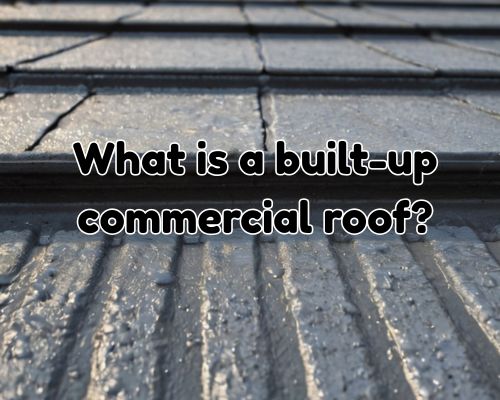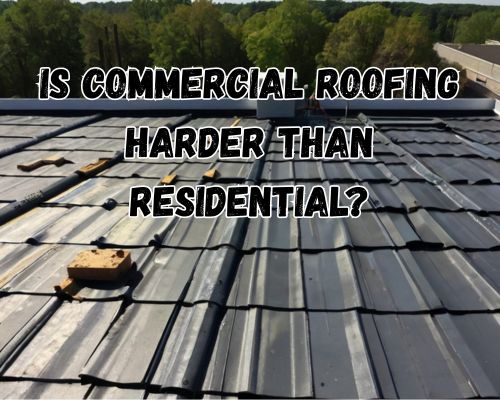What Is a Built-Up Commercial Roof? | New Jersey Property Owner’s Guide to BUR Roofing Systems
When it comes to safeguarding large commercial buildings in New Jersey, one roofing system stands out for its time-tested durability and resilience: the Built-Up Roof, commonly known as BUR. But what is a built-up commercial roof, and why is it still a popular choice among building owners, facility managers, and contractors across the Garden State?

With Charles Jimerson of CJ Commercial Roofing NJ, we’ll break down the structure, benefits, and regional considerations of built-up commercial roofs—offering local insights and LSI-rich SEO content to help you make an informed roofing decision that’s built to last.
🔍 Understanding the Basics: What Is a Built-Up Commercial Roof?
A built-up roofing system (BUR) is a layered, multi-ply roofing solution made up of alternating layers of bitumen (asphalt or coal tar) and reinforcing fabrics, typically topped with a layer of gravel or mineral cap sheets. This time-tested roofing method has been in use for over a century and is most commonly applied to low-slope and flat commercial roofs.
Key Components of a BUR System:
- Base Sheet – The first ply, often mechanically attached or adhered directly to the roof deck.
- Bitumen Layers – Applied hot or cold, acting as the waterproofing agent.
- Reinforcement Layers – Fiberglass or organic mats that add tensile strength.
- Surfacing Layer – Usually gravel or mineral granules, offering UV protection and added weight.
This multi-ply configuration gives BUR its reputation for redundancy and strength, especially important in coastal and urban areas like Newark, Jersey City, and Atlantic City where extreme weather, foot traffic, or industrial activity may accelerate roof wear.
🌟 Why Are Built-Up Roofs Popular in New Jersey?
In New Jersey’s diverse climate—which spans hot, humid summers and frigid, icy winters—building envelopes must be designed to handle substantial thermal cycling, UV exposure, and occasional nor’easters. BUR systems, with their thick, layered build, excel in temperature regulation and weather resistance.
Regional Benefits of BUR in New Jersey:
- ✅ Thermal Performance – Helps maintain stable indoor temps in variable climates like those in Trenton and Edison.
- ✅ Waterproofing Integrity – Especially beneficial in flood-prone coastal zones such as Long Branch and Cape May.
- ✅ Wind Resistance – Adheres well under the pressure of seasonal storm activity.
- ✅ Durability Under Foot Traffic – Ideal for commercial buildings in Newark or Elizabeth where rooftop HVAC units or service foot traffic are frequent.
🧠 LSI Keywords & Salient Entities for BUR Systems
To further optimize your search visibility and provide SEO relevance, this article includes latent semantic indexing (LSI) keywords and salient roofing entities:
- LSI Keywords: commercial flat roof, modified bitumen, roof membrane, industrial roofing system, asphalt roofing, roof insulation, gravel roofing system, roof maintenance, waterproof roofing solution
- Salient Entities: roofing contractor, New Jersey Department of Community Affairs, low-slope roof, commercial roofing materials, American Society for Testing and Materials (ASTM), thermal insulation, HVAC platforms, energy-efficient roofing
⚖️ BUR vs. Other Commercial Roofing Systems
While EPDM, TPO, and metal roofing systems dominate certain markets, BUR still holds its own thanks to its proven legacy and robust waterproofing capabilities. Here’s how BUR compares in the New Jersey context:
| Roofing Type | Pros | Cons | Best For |
|---|---|---|---|
| BUR | Durable, time-tested, great waterproofing | Heavy, installation involves hot tar | Older buildings, industrial sites |
| TPO | Energy-efficient, reflective, light-weight | Shorter lifespan, puncture-prone | Green-certified or modern facilities |
| EPDM | Affordable, UV resistant | Seams vulnerable to leaks | Offices, warehouses |
| Metal Roofing | Long lifespan, recyclable | Expensive, noisy | High-end or aesthetic builds |
In urban environments like Jersey City, BUR’s ability to resist mechanical damage is crucial. Meanwhile, industrial facilities in Bayonne or Paterson benefit from its longevity and layered waterproofing.
🏗️ Installation Process of a BUR System
Installing a built-up commercial roof is a specialized process typically carried out by licensed New Jersey commercial roofing contractors. The process generally involves:
- Inspection & Tear-Off – Evaluate the existing structure and remove old roofing.
- Deck Prep – Clean, prime, and repair the roof deck.
- Base Sheet Application – Mechanically fastened or adhered.
- Bitumen & Ply Layers – Hot mopped or cold-applied asphalt alternates with fiberglass mats.
- Surfacing – A final aggregate (gravel or mineral) is embedded into the top coat for UV protection and impact resistance.
This installation may be disruptive, so proper planning around business hours and foot traffic is crucial. It’s also advisable to select a contractor experienced with state and local building codes, such as those enforced in Passaic County or Middlesex County.
🛠️ Maintenance and Lifespan in New Jersey Conditions
A well-installed BUR system in New Jersey’s climate can last anywhere from 20 to 30 years, depending on the quality of materials, workmanship, and routine maintenance.
Tips for Extending BUR Lifespan:
- 🧹 Regular Debris Removal (especially in areas like Montclair with heavy tree cover)
- 🕵️♂️ Annual Inspections – Particularly after winter freezes or summer storms
- 🧰 Re-coating – Applying a reflective aluminum coating can extend life and reduce heat absorption
Regular inspections by local professionals in Somerset County or Bergen County can help catch early signs of degradation, such as blistering, ponding, or membrane separation. For more, visit https://cjcommercialroofingnj.com/.
💵 What Does a Built-Up Roof Cost in New Jersey?
Costs for BUR systems in New Jersey commercial markets typically range between $5 to $10 per square foot, depending on:
- Roof size and slope
- Tear-off requirements
- Type and number of plies
- Surfacing materials (gravel vs. mineral cap)
- Labor costs in counties like Union County or Morris County
For a 10,000 sq ft warehouse roof in Newark, total installation could range from $50,000 to $100,000.
✅ Choosing a Trusted Roofing Contractor in New Jersey
When selecting a roofing contractor, prioritize those with experience in commercial BUR systems, a valid New Jersey contractor license, and familiarity with state fire codes and energy efficiency requirements.
Recommended qualifications:
- GAF or CertainTeed certified
- OSHA-compliant teams
- Active liability insurance
- References in local areas like Cherry Hill, Hoboken, or Paramus
🏁 Final Thoughts: Is a Built-Up Roof Right for Your New Jersey Business?
If you’re managing a property with a flat or low-slope roof in New Jersey, and your priorities include proven durability, exceptional waterproofing, and load resistance, then built-up roofing systems deserve your serious consideration. While newer membranes may boast flashier tech, BUR continues to dominate where reliability counts most.
Whether you’re retrofitting a mid-century school in Hackensack, upgrading an industrial plant in Camden, or expanding a retail space in Morristown, BUR could be the solid foundation your roof needs—literally.
